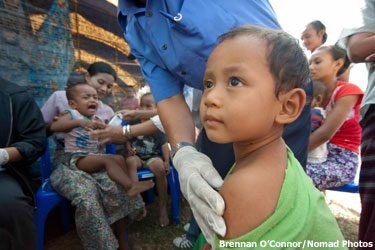On the heels of the largest influx of Burmese refugees to Thailand in a decade, assistance organisations are calling for a global response in ensuring a holistic system of aid ...
Chiang Mai (Mizzima) – On the heels of the largest influx of Burmese refugees to Thailand in a decade, assistance organisations are calling for a global response in ensuring a holistic system of aid is in place for those displaced.
 The Forum of Burma’s Community-Based Organisations (FCOB), a consortium of more than 20 like-minded assistance groups based along the Thai-Burmese border, has written to supporters to pressure governments and aid organisations to work together in designing a concrete plan to deal with expected increased numbers of Burmese refugees fleeing to Thailand.
The Forum of Burma’s Community-Based Organisations (FCOB), a consortium of more than 20 like-minded assistance groups based along the Thai-Burmese border, has written to supporters to pressure governments and aid organisations to work together in designing a concrete plan to deal with expected increased numbers of Burmese refugees fleeing to Thailand.
“In order to ensure the safety of such civilians [those fleeing Burma], there needs to be a concrete plan in place for Thai authorities and non-governmental organisations to provide the necessary protection and assistance to civilians until they feel safe for them to return home,” stipulates the appeal missive.
In meeting with international government and non-governmental leaders, the FCOB urges advocates to push for an end to hostilities; commencement of a tripartite dialogue among Burmese authorities, ethnic and political opposition leaders; involvement of the UN refugee body, the UNHCR; and, acceptance of the Royal Thai government in facilitating both time-sensitive assistance and repatriation.
On November 8 alone, one day after Burma’s general election, around 30,000 Burmese were estimated to have fled to Thailand in the face of fresh hostilities between the Burmese Army and an armed ethnic opposition group. In the vicinity of the Burmese border town of Myawaddy, 25,000 were believed to have crossed into Thailand.
Though most of those who initially fled are judged to have since returned, FCOB estimates 3,600 continue to receive assistance along the Thai border, with a few thousand more stranded on the Burmese side and an unknown number of refugees in hiding on the Thai side of the frontier.
FCOB, buttressing its appeal, cautions that in the wake of the troubled November election along with the continued rejection of the central government’s Border Guard Force proposal by several armed ethnic groups, “further escalations in conflict and insecurity are likely in the ethnic areas bordering Thailand, India and China”.
The appeal was signed by FCOB co-ordinator Dr. Cynthia Maung, the highly respected founder of the Mao Tao Clinic on the outskirts of Mae Sot, a short distance from Myawaddy.
The FCOB also encouraged supporters to protest outside Burmese embassies around the world on December 10, UN International Human Rights Day.



